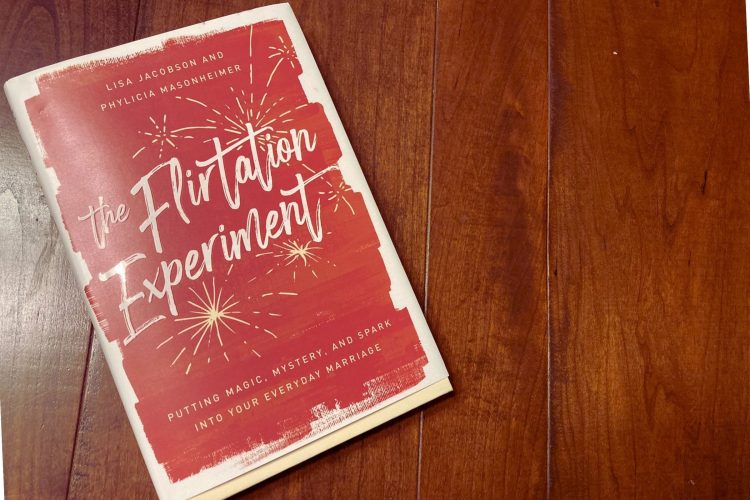It’s as clear in my mind as if it happened yesterday.
I was a first-year student at Bible college and had just confessed to a years-long struggle with hardcore pornography. My three roommates didn’t know. They just knew I had stuff I was working through.
During free time one day, one of my roommates looked up from the book she was reading.
“Guys! Listen to this!”
She began to quote several sentences from a “sex scene” in the book. It was veiled, and definitely not anything like the sex scenes I used to read at school on the library computers. Still, I recognized one when I heard one. She read the last line with a subtle inflection. If a voice could wink, hers did, and the three of them burst into giddy laughter.
For them, it was a casual comment. The whole interaction took less than five minutes before they were back to their individual activities. If I asked them about it today, I doubt any of them would remember it.
For me, it set off a tidal wave of images, videos, imaginations. In a time when I was desperately trying to control my thoughts and break free from pornography, those few sentences were unwelcome and unhelpful. The scene from a Christian fictionalization of Hosea took its place beside years of stored-up memories from hardcore pornography. For days, I played those sentences over in my mind, more than capable of painting a mental picture.
That scene has never left my mind. Even in marriage, there have been moments when I have thought, “Maybe I should try what they did in that scene in that book.”
The book she was reading: Redeeming Love.
That was the first time I realized Christian romance novels could double as erotica.
Some of you are thinking “duh, Jessica.” Because that’s what you struggle with. For some of you it was your gateway into this whole thing.
I know when we talk about women struggling with pornography, most people assume we’re talking about romance novels. I’ve even read articles from Christian experts explaining that romance is to women like porn is to men. They say, romance novels give women unrealistic expectations of relationships just like pornography gives men unrealistic expectations of sex. It’s the heart/eye dichotomy.
The assumption is women struggle with their hearts while men struggle with their eyes.
But I struggled with my eyes and mind just as much if not more than I struggled with my “heart.”
Christian romance novels had never been my thing. Ever. I am not the Hallmark movie kind of girl. My mom once got me an anthology of Christian Christmas romance stories and I about gagged at the cheesiness of them.
For a long time, my pursuit of relationships was less about romance and more about sex. I didn’t care if he bought me chocolate. I never expected a man to bring me flowers and chocolate. In fact, I developed a sincere distaste for roses because I thought they were boring and commonplace. What’s so special about a dozen roses when everyone gets them, they aren’t even that pretty, and they smell weird? Bring me grocery store Gerber daisies and sour patch kids any day.
The question I needed to answer in any potential relationship was “could I see myself sleeping with him?” When I wanted to feel more Christian about it, I would just imagine that scene from Redeeming Love. Because surely when a Christian imagines themselves having “Christian sex” that makes the fantasy ok, right?
To be clear, that moment in college happened nearly 20 (gulp) years ago. Twenty years. I had to recalculate just to be sure.
I recently discovered Redeeming Love is being made into a movie. And while there may be some goodness, I’m 100% sure I’m never going to go see it.
If you are a woman who struggles with pornography or sexual fantasy, I would encourage you not to see Redeeming Love.
First, in the interest of full disclosure, I have never read the book. Years ago, I was gifted a bunch of Francine Rivers books and the first thing I did was get rid of Redeeming Love. If one paragraph could haunt my memory for decades, the last thing I needed was an entire book.
I have seen many different viewpoints in the recent discussions around the movie from women who have a history of struggling with pornography. One friend shared that a mentor recommended Redeeming Love to her while she was healing from pornography. She felt the picture of sex as a beautiful God-given gift in marriage helped heal her vision of what sex should be like.
Almost immediately after she shared that with me, a reader shared that books like Redeeming Love served as a gateway for her into soft porn and more.
Others came forward with pasts of sexual trauma and abuse sharing that Redeeming Love retraumatized them.
Others shared that this book was one of their absolute favorites ever.
It seems, perhaps, for those who are able to “overlook” the sexual content, the theme of redeeming love is healing and beautiful. But then there are people (like me, I guess?) who can’t get past the sexual content, regardless of whatever beautiful truth it is trying to illustrate.
It’s the exact same issue I had leading up to my wedding when my soon-to-be husband suggested a Christian book on sex… complete with illustrations. A friend had suggested it to him. The friend said it was good and helpful. Just looking at it gave me a panic attack and landed me in counseling.
This leaves us with a problem, doesn’t it?
Isn’t it crazy that one book can be a “gateway of healing” for one person and a “gateway to slavery” for another?
It’s very similar to a paper a friend of mine once wrote about The Scarlet Letter, a classic book by Nathaniel Hawthorne. In her paper, she called out the cowardice of Arthur Dimmesdale, the priest who fathered the illegitimate child of Hester Prynne (the book’s main character). Hester was forced to wear a scarlet letter A as a sign of her adultery, while Dimmesdale remained mum, flogging himself in secret as penance for his sins.
I read my friend’s paper and wept. She eviscerated Dimmesdale and I took it personally. I had always identified with Dimmesdale. I read that book in the height of my own struggle with pornography, overcome by shame in my own life. Inspired by Dimmesdale’s penance, I began beating my back with wet towels when I would overindulge in pornography. I was Dimmesdale.
She came to the book with a sympathy for Hester. I came with an understanding of Dimmesdale. We walked away with two very different experiences.
When we’re reading, our life experience interacts with the words we’re seeing on the page. We bring our own thoughts about tone, body language, intent, and motive. We help fill in the blanks.
I think that’s why Redeeming Love can be a balm of healing for some and a worst nightmare for others.
As I’ve read reviews of the book in recent days, I’ve seen readers cite gratuitous and unnecessary descriptions of sex, sexual violence, even rape. Years ago, similar themes came out in 50 Shades of Gray and the Christian world collective nearly lost its mind. No Christian woman should be reading that filth in the name of entertainment. Is it suddenly ok when it’s part of a story meant to show the love of Jesus?
This is why discernment and an understanding of boundaries for our own walks in freedom is so important. We cannot simply buy into a culture or a narrative because it has the label of Christian or a sprinkle of Jesus.
In the months after first starting this blog, I had a reader try to introduce me to the world of “Christian soft core.” He hosted a website of photos with clearly naked people (though no body parts were shown), clearly engaged in sexual acts. He shared some of these photos with me arguing that they honored God because they showed the beauty of sex without any actual nudity.
Perhaps to some it seems “safe.” After all, doesn’t God want us to celebrate and honor sex?
But I have to ask myself, “If this weren’t labeled Christian, what would non-Christians call it?” They would call it porn.
And I think, for many people, they feel Redeeming Love is erotica.
Which means we need to be very careful, and that’s just with the book.
I know what I can handle. I know my own weakness, and I know better than to toy with it for the sake of some inspirational storyline. I also can’t in good conscience ever tell anyone to read the book.
And I know some people have a problem with that. I have seen it in Facebook comments. People like me need to get our minds out of the gutter. We need to get our priorities in the right place, etc.
But in the Bible, when situations like this arise, the weaker Christians are not told to toughen up, they are honored, cared for, considered. (See 1 Corinthians 9)
If you have an issue with how I feel about the book, then let me encourage you not to watch the movie.
The movie takes this to an entirely different level.
According to a Plugged In review of the movie, it depicts scenes that would border on softcore pornography.
“…we were baffled by how explicit the content was.
Angel and Michael have sex twice. Both lengthy scenes (nearly four minutes of combined screentime) involve explicit movements, ecstatic facial expressions and sounds that definitely strain at the boundaries of what’s allowable in a PG-13 movie…
Angel is naked on at least three occasions, though nothing is fully revealed due to clever camerawork. However, on multiple occasions, her breasts are only covered by her hair or, in one instance, Michael’s hands.” (Read the full review here)
From where I stand, the movie is just doing what I imagined the book would be doing anyway but it sounds like a lot of Redeeming Love fans may be really surprised/disappointed.
The agency you bring to a page as a reader (the ability to fill in the blanks) is taken from you in a movie. The director calls the shots– that is literally their job. It is their job to fill in the blanks for you, with the goal of drawing you in to the story line.
Unfortunately, it sounds like with this movie, the story line is going to follow a track many people may not want to be on.






